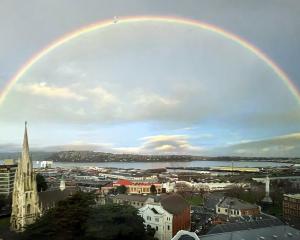It is hard to see the annoying but seemingly innocuous plastic packaging gleefully ripped off a new toy as a future killer. Bruce Munro takes a look at how our use of ''fantastic plastic'' is choking our planet, and asks what should be done.
Dr Maureen Howard is buying liver for dinner.
She is a flexi-vegetarian who needs to keep her iron count up.
So, when she does buy meat, about once a week, she prefers to visit the local butcher who has ''gone organic''.
She selects her desired portion, and holds up a jar.
The butcher does not hesitate; he knows the drill.
He drops the liver into the wide-necked glass container that once held pickles, and she screws on the lid.
Outside, Dr Howard opens one of the panniers on her bicycle and slides in the jar, next to a cloth bag.
The reusable bag holds a few other ingredients for her evening meal, bought at the supermarket just across the road.
What you will not find in that bag is cottage cheese.
''I used to buy cottage cheese in my early 20s, but I've gotten out of the habit because it is a product that comes with packaging,'' Dr Howard explains.
Instead, she has developed a taste for foods that are not packaged. She also grows and makes her own food - vegetables, bread, margarine ...
''I make my own peanut butter. That's really easy to make.
''You know what is in it, and it's much cheaper than the processed products.''
It is not that Dr Howard is anti-plastic, nor even plastic-free.
In the other pannier is a plastic bottle of vinegar, refilled at a city shop that welcomes customers who like to bring their own containers.
At home is a laptop with a shiny black plastic casing; there is composite plastic insulation in the ceiling, and a polystyrene chilly bin at the ready.
''Plastic is an amazing product. It should be used for things that are really useful,'' she says.
''But in terms of this single-use packaging, if we can look for alternatives, that's the way to go.''
Dr Howard begins the ascent to her home in Pine Hill, Dunedin.
The city council-contracted sustainability educator is walking, or rather pedalling, the talk; motivated by a grave concern about what our unchecked use of plastics is doing to the planet.
The first fully synthetic plastic, and the name for this wondrous, malleable, cheap, waterproof product, was invented in 1907.
More than a century later, the rate of plastic production and variety of its uses is still growing.
Globally we manufacture at least 300 million tonnes of plastic each year, for everything from cars to cosmetics.
A growth area is microplastics; barely visible plastic beads that are increasingly used in toothpastes, gels and facial cleansers.
But growing at an even greater pace are concerns about plastic pollution and the harm it is doing.
The United Nations Environment Programme (Unep) has put the cost of plastic pollution - production and incineration of plastics as well as pollution of the marine environment by plastics - at US$75 billion (NZ$97.4 billion) a year.
About 85% of plastic waste worldwide is not recycled. Eight million tonnes of that ends up in oceans, every year.
That, says the UN, is the same as placing 15 rubbish bags filled with waste plastic on every metre of coastline on the planet.
In our oceans, about 100,000 marine mammals and turtles, and up to 1 million seabirds, are killed by plastic rubbish each year.
Plastic's large molecules do not break down quickly.
A single plastic bag can take 10 to 20 years to degrade in salt water, a plastic bottle takes a century, and a heavier plastic container up to 400 years.
When it has been broken into barely visible pieces, scientists say it then poses new threats.
Trillions of microplastics are floating in the world's rivers, lakes and seas, with more added every minute.
Researchers have discovered communities of microbes living on microplastics.
These ''plastispheres'' can transport harmful microbes and pathogens.
The surface of microplastics can also attract and absorb organic pollutants such as PCBs and DDT.
It is feared these could be ingested by fish, then concentrated as they are passed up the food chain, eventually reaching humans in harmful quantities.
Some say our plastic footprint is now as big a concern as carbon.
The UN has published more than one report on plastics.
''The environmental impacts of the way we use them cannot be ignored,'' Unep executive director Achim Steiner warned in a report last year.
This week, the European Parliament voted to reduce the use of thin plastic bags in European Union countries by 80% within a decade, in an effort to curb plastic pollution.
Worldwide, one million plastic bags are used every minute.
New Zealanders use up to a billion plastic bags per year, with the majority of bags in use for only 12 minutes.
In New Zealand, plastics are the second-largest type of waste going to landfill after organic waste such as food and garden rubbish.
Plastics make up 15% of our 2.8 million tonnes of annual landfill waste. This has increased from about 9% in 2006.
It is estimated that local authorities are spending tens of millions of dollars each year to deal with packaging waste, the majority of which is plastics.
Dunedin, like most urban centres in New Zealand, has a kerbside recycling programme.
In the 12 months to February, the city's recycling scheme netted 8713 tonnes of recyclables, including 500 tonnes of plastic, Catherine Irvine, who is the city's acting solid waste manager, says.
Of these, there is a good market for PET and HDPE plastics (such as soft drink and milk bottles) but not for plastics 3 to 7 (including ice-cream pottles, shampoo bottles and yoghurt containers).
The city does not recycle soft plastics, such as supermarket bags, because they clog the recycling plant's automated machinery, Ms Irvine says.
Reducing the use of soft plastics is the natural way to begin tackling the problem, Associate Professor Ben Wooliscroft says.
The University of Otago marketing researcher has studied the typical New Zealander's pathway to ethical consumption.
He says there is a hierarchy of behaviours, from easy to hard.
If a person does not take an easy step, they are extremely unlikely to take a much harder step.
And the easiest first step for individuals, after kerbside recycling, is choosing to use reusable bags when they go to the supermarket, Assoc Prof Wooliscroft says.
Packaging waste is a bigger problem than supermarket bags.
But avoiding excess packaging is a couple of rungs higher up the ladder than choosing reusable supermarket bags.
Trying to get people to leap-frog to the higher ethical behaviour is like ''trying to get someone to stop smoking who has not thought about it yet'', he says.
Which probably explains why the EU has introduced its new plastic bag reduction target.
And why, in this country, Green Party MP Denise Roche has recently called for a plastic bag-free New Zealand.
The Packaging Forum, which represents the packaging industry in this country, is also getting in on the act.
While it wants to be left to voluntarily increase packaging recycling, it also levies its members to fund glass and public-place recycling schemes. And its latest venture, still in the pipeline, is a plan to offer soft plastic recycling bins at some supermarkets and other stores.
But there is a quicker way, Assoc Prof Wooliscroft says.
Rather than getting the public to take baby steps towards eventually addressing the more pressing problems of consumption, the Government could intervene to change the order of the rungs, making more urgent steps easier to take.
''We can change the pathway,'' he says.
''There's nothing that says governments can't change it.''
The Government's own Ministry for the Environment appears to be aware of the possibility.
Last month, the ministry published a summary of public submissions it has received on a proposal to intervene to improve the management of four different types of waste.
The four waste streams it suggested targeting were electronic and electrical equipment, tyres, agrichemicals and farm plastics, and refrigerants and other synthetic greenhouse gases.
In the report, the ministry says ''A number of submitters identified additional priority waste streams; the most frequently mentioned being packaging and/or plastic/plastic bags''.
The ministry will make its recommendations to Minister for the Environment Dr Nick Smith sometime this month.
Dr Smith says it will be important to focus on ''those parts of the waste streams that pose the greatest long-term risk to the environment''.
He is clear that he does not believe that includes plastic bags.
''Plastic bags are a very small proportion of the waste stream, about 0.1%,'' he says.
''In the public's mind, because plastic bags are a product we use all the time, it feels like a lot. But in practice it is a very small portion.''
But it is less clear what priority Dr Smith places on dealing with waste plastics generally.
The most he will say at the moment, is that there are some plastics that pose a greater environmental risk and which ''we could do better on recycling''.
Assoc Prof Wooliscroft is adamant the Government should act.
''The Government could put a price on plastic,'' he says.
Not everything in society should have a price on it, he believes.
But pricing can help when dealing with business, he adds.
''To help them `up their game'; to redirect their focus.''
Plastic consumption is an urgent society-wide cultural issue; a problem which needs all parties to be involved.
''And sometimes that means government taking a lead,'' Assoc Prof Wooliscroft says.
''We have a government that is very keen on standing back and letting the market do its thing, and isn't very keen on capturing the costs the market puts on the environment and society and passing them back to business.
''If businesses were responsible for the full cost of what they are selling, we'd see some quite different behaviour.''











